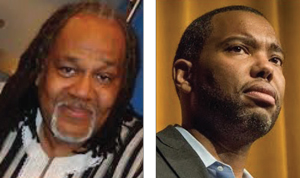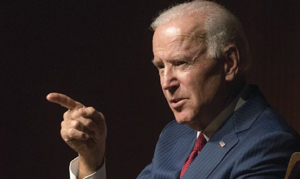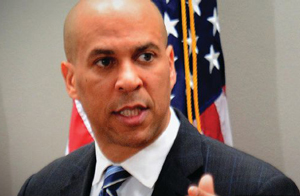Reparations for Blacks emerges as serious issue for 2020 elections
By Bryan 18X Crawford -Contributing Writer- | Last updated: May 1, 2019 - 3:27:32 PMWhat's your opinion on this article?
‘We built America under duress from White people’

(l) Dr. Ray Winbush (r) Ta-Nehisi Coates
|
Still, the conversation about redress for descendants of enslaved Africans who’ve endured 500 years of abuse that remains prevalent in America looks to be driving a shift in consciousness, and a heightened awareness of what is owed to Black people.
“What Black people have been doing for the past 500 years is cleaning up White people’s mess, and White America—and the White world—doesn’t want to admit that,” Dr. Ray Winbush, a professor at Morgan State University, told The Final Call. “It’s refreshing that the conversation is happening now because it’s a discussion that Black people and White people need to have; but especially White people because they need to be able to discuss honestly what this country has been about.”

|
America’s history of chattel slavery, the subsequent horrors associated with it, and the financial windfall this country has reaped for centuries on the backs of Black people is well documented. While some have had their interest piqued by renewal of the reparations’ conversation, the discussion is far from new. Writer Ta-Nehisi Coates, of The Atlantic in 2014, wrote “The Case for Reparations,” an extensive piece lauded by Whites that helped to bring “respectability” to a “radical” topic. It offered an important moment and helped expand public dialogue. But the discussion is an old one.
What has not been seen is reparations discussed in mainstream media in the context of serious political discourse. For some involved in the reparations fight going back decades, this is a gift and a curse.
“History is our best teacher. If you look at it historically and geographically, the most common political dialogue that Black people have had in this country and all over the world—and I’m not exaggerating—has been reparations,” Dr. Winbush explained. “Black Americans, we’ve just got to study our history. That so-called 40 acres and a mule that was promised to us in 1865 is something that all Black folks, since that time, have discussed. So, I think the universality, or the belief that we are owed something by the European and American powers for their enslavement, colonization, and all the tragedies meted on Black people needs to be dealt with.”
“The conversation of reparations is nothing new, but I think it’s great that it’s now in the media, and we’ve known for quite some time that for us to move this struggle forward and drive this issue, the media has to pick it up,” Kamm Howard, national male co-chair of N’COBRA (National Coalition of Blacks for Reparations in America), and who recently stood alongside National of Islam Minister Louis Farrakhan as he endorsed the group’s upcoming national convention, told The Final Call. N’COBRA is planning a national conference in Detroit in July.
“And the media has picked it up around a presidential campaign, not around a particular strategy, but they’ve picked it up and that’s good,” Mr. Howard noted. “But I think presidential candidates—like any candidate—will speak to issues that they’re made to speak to that are put before them, whether they have the desire to move the issue forward or not, and I think that’s what’s being done. I haven’t seen any candidate that even appears to understand reparations and why there’s been this continued push for it, because this is not something that we’ve ever let die. And I believe there are some who feel that we should’ve let this issue go a long time ago; Bernie Sanders being one in particular.”
The reparations topic has become an important one for Democratic presidential candidates who have, thus far, been the only ones asked to address it.
The emergence of #ADOS (American Descendants of Slaves), an organization started by Yvette Carnell, founder of the website “Breaking Brown,” and Antonio Moore, a former district attorney in Los Angeles, has pushed reparations discussions through online activism. However, some critics of the #ADOS movement have questioned some of their methods and motivations in the reparations fight. Still, there is no question that #ADOS has leveraged the internet to politicize reparations as evidenced by the many Democratic presidential hopefuls who support reparations-related research legislation.
Outreach to ADOS spokespersons April 26 were not met with responses at Final Call press time. The group plans to hold a conference in October at Simmons College in Louisville.
Sen. Bernie Sanders of Vermont, who has thrown his name into the 2020 presidential race, making another run at it, has consistently opposed reparations for Black people. Joe Biden, who served as vice president under Barack Obama and authored a 1990s crime bill that helped incarcerate almost two generations of Black men, recently declared as a Democratic presidential candidate for 2020.
Comments he made about reparations in 1975 resurfaced as there were questions about whether he would enter the political fray. “I do not buy the concept, popular in the ‘60s, which said, ‘We have suppressed the Black man for 300 years and the White man is now far ahead in the race for everything our society offers. In order to even the score, we must now give the Black man a head start, or even hold the White man back, to even the race.’ I don’t buy that,” the former vice president said, at the time. “I don’t feel responsible for the sins of my father and grandfather. I feel responsible for what the situation is today, for the sins of my own generation. And I’ll be damned if I feel responsible to pay for what happened 300 years ago.”
He has not commented today about his views on reparations, which President Obama also opposed.

Senator and 2020 Presidential candidate Joe Biden
|
“America fundamentally opposes our existence,” Dr. Kwame Zulu Shabazz, a former professor of Africana Studies, told The Final Call.
“America started out being at war with Black people and is maintained by a perpetual war with Black people. But, America can’t function without exploiting Black and African resources,” Mr. Shabazz said, adding, “[Black] people love to say that we built America; but that’s only partially true. We built America under duress from White people. We built a structure that furthers our oppression, but not of our own volition. [America] was a White [people] project and our ancestors were forced to build it.”
Understanding Reparations: What is It?
When people hear the word reparations, generally speaking, the first thought that comes to mind is money. However, the concept is much more nuanced and deeper than the simple act of cutting a check. This general lack of understanding about what reparations entails has added some confusion to the issue. Those involved in the fight much longer than the few months it has become a national political issue are very clear on what reparations are and what it should look like.
“N’COBRA has always said that reparations is about repair, and we have to put the word repair back into reparations so as not to look at it as just a monetary piece,” Mr. Howard said. “Although compensation is a part of repair—it’s not a major part. And we’re also not against compensation, we have to make sure that Black people know that it’s much more than that.” (See related story page 17.)
Mr. Howard explained the N’COBRA position is tied to “full repair”—a term recognized internationally with respect to the concept of reparations—which highlights outcomes to begin addressing and correcting the wrongs done. An example of trying to right past wrongs can be found at Georgetown University, where students elected to increase their tuition by $27.20 and have the extra money put into a fund to benefit the descendants of the 272 African slaves the university owned and sold in 1838 to secure a future of the school. Georgetown has an undergraduate student population of approximately 7,463 people. This means the reparations fund, which would be used to support health care and education programs in Maryland and Louisiana, where the more than 4,000 descendants of the enslaved Africans are said to live, would come out to just shy of $203,000 annually.
Other examples of full repair include wiping out all of the long-term consequences that chattel slavery, Jim Crow and racial oppression have on Black people. This includes both a cessation and guarantee of non-repetition of the harmful acts—such as slavery, Jim Crow, mass incarceration, police brutality—alongside restitution and compensation for these acts.
Then, there is the restoration and rehabilitation of the dignity of all the Black people affected both directly, and indirectly.
Mr. Howard sees the rehabilitation aspect of reparations in the concept of transgenerational epigenetics, a science which studies how trauma and terror can alter the genetic code of those affected—and pass those negatives down generations in actual genes.
“This [epigenetics] concept was first discovered in the grandchildren of Jewish Holocaust survivors. They found that these people had a gene that was altered that caused them to be much more likely to suffer from heart attacks and strokes as the progeny of those who lived through that time, compared to their peers whose grandparents had not been through the Holocaust,” Mr. Howard explained.
“Black people suffered 500 years of terror as opposed to the Jews six years, so we know that our genes have been altered. This is why Black people, men specifically, acquire and die of these diseases much earlier than anyone else in this country. So we have to create systems to address the transgenerational epigenetics injuries that we’ve accrued living in this country.”
Dr. Shabazz echoed this sentiment, using the life of Malcolm X as a transgenerational epigenetics example.
“Growing up, Malcolm’s family was self-reliant, proud Black people. Then White people came in and killed his father, and I believe he also had brothers and uncles killed by White men. Then those same White people, after they killed the men in his family and create all this stress within his family, then come along and ask what’s wrong this family, after they’ve destroyed it. Then the government comes in and takes the kids away from his mother. In other words, the system that destroys our family and makes us dependent on them, then blames us for our dependency. The problem isn’t us. It’s the system that has harmed us,” Dr. Shabazz explained.
It’s difficult to accurately categorize reparations as a moral issue, a legal issue, or a political issue. For some reparations is tied to one of those things, and for others, all of them. However, the sobering reality—particularly if the aforementioned polls are any indication—is that America and the American people, no matter how much lip service they pay to the issue, have no plan or desire to pay for her past sins right now.
“We should be encouraging our people to be self-determining, but it’s difficult because this system smashes any tendency towards Black people being self-determining because it wants us to be dependent on it,” Dr. Shabazz said. “Every Black person in America has been indoctrinated, and this indoctrination makes you dependent on the same system that oppresses you.”
“Reparations isn’t foreign to the global community. But, America sees itself above the Human Rights Commission, above the United Nations Security Council; America sees itself above anybody else on the planet, and encompasses not only White superiority, but American superiority,” Mr. Howard explained. “The United States has always seen itself as being above the law, and that’s one of the main struggles that we have. The church calls this a moral issue, but it’s much more than that. The United Nations called American chattel slavery a crime against humanity, which it was and always should’ve been classified as. So, we need to push reparations as the result of a criminal act committed by a state against a specific people, and so we’re seeking to address it as a crime and the manner of redress should be full repair.”

New Jersey Senator Cory Booker, who is running for president, is pushing a Senate bill toadd to the reparations conversation.
|
“This bill is a way of addressing head-on the persistence of racism, White supremacy, and implicit racial bias. It will bring together the best minds to study the issue and propose solutions that will finally begin to right the economic scales of past harms and make sure we are a country where all dignity and humanity is affirmed.”
According to the Congress.gov website, S.1083 is, “A bill to address the fundamental injustice, cruelty, brutality, and inhumanity of slavery in the United States and the 13 American colonies between 1619 and 1865 and to establish a commission to study and consider a national apology and proposal for reparations for the institution of slavery, its subsequent de jure and de facto racial and economic discrimination against African-Americans, and the impact of these forces on living African-Americans, to make recommendations to the Congress on appropriate remedies, and for other purposes.”
In the Senate, S.1083, acts as a companion to House bill H.R.40 on reparations. Proponents of reparations, and those who have long been active in this fight, were pleased that Sen. Booker became the first person to sponsor a bill like this in the Senate.
“I’m glad that there’s a comparable bill being introduced by Senator Booker in the Senate similar to HR-40 bill in the House. Discussions of reparations for the Trans-Atlantic Slave Trade, must occur in all aspects of American life if ‘America’ is to be the ‘America’ outlined in its founding documents,” commented Dr. Winbush, author of “Should America Pay? Slavery and the Raging Debate on Reparations.”
A House bill to research possible reparations for slavery, H.R.40, has been around for nearly three decades, introduced by former Michigan Rep. John Conyers in 1989, and every year thereafter until he resigned in 2017. H.R.40 was reintroduced in 2019 by Rep. Sheila Jackson-Lee of Texas in January.
“The goal of H.R.40 is to develop remedies, and part of the task is to study the wide ranging impact on us—current living Africans—from periods of enslavement, segregation, and ongoing crimes committed against our ancestors and on. After studying those impacts, now remedies must be developed to address those impacts in terms of the injuries that we’ve suffered from those crimes,” Mr. Howard explained.
“[S.1083] will aim to help create a body—like a commission—of experts to the table to craft a Marshall-like Plan of repair; something that could be multigenerational in its scope. The commission will be charged to come up with [reparations] outcomes that are in line with international norms related to full repair,” Mr. Howard added.
“Elected officials must be held accountable for their support of reparations for Black people in America,” Dr. Winbush said. “If they do not support reparations, Black people should not vote for them, but vote for candidates who do. Reparations should be a political litmus test for any candidate seeking the Black vote … This is a discussion that must be had by all political parties in the U.S. and even if [politicians] reject the idea, we must continue the struggle. This is a long distance race.”
Among Democrats, presidential candidates Elizabeth Warren, Kamala Harris and Beto O’Rourke have expressed support for discussing reparations. Marianne Williamson, who has priced reparations anywhere from $100 billion up to $500 billion, proposes money for economic benefit and education, not cash payments. Julian Castro, a former Obama administration official, has endorsed reparations but not presented a fully thought out concept. He has talked suggested investments in housing and education.
The senators and Mr. O’Rourke have also proposed federal actions that would include income support, housing, education or programs to close the country’s wealth and opportunity gap. Reparations advocates say these ideas don’t go near far enough.
Bernie Sanders has seemed exasperated by the raising of the subject, often saying he doesn’t understand or asking, “What does that mean?’ when questioned about reparations. He has previously rejected the idea that Congress would ever pass a reparations bill and has decried idea as divisive. He does support a plan put forward by South Carolina Democrat James Clyburn, a Black congressman, that would focus on and put federal resources into communities that have suffered disproportionately from high level poverty and other problems for decades.
But Sen. Sanders, Sen. Booker, Sen. Harris, Sen. Warren and Mr. O’Rourke committed to signing reparations study legislation if passed by Congress and if they are president. They made the commitments in April at the Rev. Al Sharpton’s National Action Network’s annual conference.
Pete Buttigieg, the gay, White, Democratic presidential hopeful, has said dealing with inequality is likely the way to right past racial wrongs. Like others, he has spoken of housing and legal system efforts to help Blacks and non-Whites. He supports the reparations study bill in the House.
(Final Call staff contributed to this report.)
INSIDE STORIES AND REVIEWS
-
-
About Harriett ... and the Negro Hollywood Road Show
By Rabiah Muhammad, Guest Columnist » Full Story -
Skepticism greets Jay-Z, NFL talk of inspiring change
By Bryan 18X Crawford and Richard B. Muhammad The Final Call Newspaper @TheFinalCall » Full Story -
The painful problem of Black girls and suicide
By Charlene Muhammad -National Correspondent- » Full Story -
Exploitation of Innocence - Report: Perceptions, policies hurting Black girls
By Charlene Muhammad -National Correspondent- » Full Story -
Big Ballin: Big ideas fuel a father’s Big Baller Brand and brash business sense
By Bryan Crawford -Contributing Writer- » Full Story






 Click Here Stay Connected!
Click Here Stay Connected!








